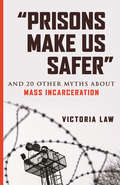- Table View
- List View
“Prisons Make Us Safer”: And 20 Other Myths about Mass Incarceration (Myths Made in America)
by Victoria LawAn accessible guide for activists, educators, and all who are interested in understanding how the prison system oppresses communities and harms individualsThe United States incarcerates more of its residents than any other nation. Though home to 5% of the global population, the United States has nearly 25% of the world's prisoners - a total of over 2 million people. This number continues to steadily rise - over the past 40 years, the number of people behind bars in the United States has increased by 500%.Journalist Victoria Law explains how racism was the catalyst for mass incarceration and has continued to be its driving force: from the post-Civil War laws that states passed to imprison former slaves, to the laws passed under the "War Against Drugs" campaign that disproportionately imprison Black people. She breaks down these complicated issues into four main parts:1. The rise and cause of mass incarceration2. Myths about prison3. Misconceptions about incarcerated people4. How to end mass incarceration Through carefully conducted research and interviews with incarcerated people, Law identifies the 21 key myths that propel and maintain mass incarceration, including: • The system is broken and we simply need some reforms to fix it • Incarceration is necessary to keep our society safe • Prison is an effective way to get people into drug treatment • Private prison corporations drive mass incarceration "Prisons Make Us Safer" is a necessary guide for all who are interested in learning about the cause and rise of mass incarceration and how we can dismantle it.
“Trash,” Censorship, and National Identity in Early Twentieth-Century Germany
by Kara L. RitzheimerConvinced that sexual immorality and unstable gender norms were endangering national recovery after World War One, German lawmakers drafted a constitution in 1919 legalizing the censorship of movies and pulp fiction, and prioritizing social rights over individual rights. These provisions enabled legislations to adopt two national censorship laws intended to regulate the movie industry and retail trade in pulp fiction. Both laws had their ideological origins in grass-roots anti-'trash' campaigns inspired by early encounters with commercial mass culture and Germany's federalist structure. Before the war, activists characterized censorship as a form of youth protection. Afterwards, they described it as a form of social welfare. Local activists and authorities enforcing the decisions of federal censors made censorship familiar and respectable even as these laws became a lightning rod for criticism of the young republic. Nazi leaders subsequently refashioned anti-'trash' rhetoric to justify the stringent censorship regime they imposed on Germany. Examines the connections between youth protection, social welfare, and censorship in late Imperial and Weimar Germany. Locates Weimar Germany's two censorship laws in post-war anxieties about gender and the new constitution's prioritization of social rights over legal rights. Uses anti-'trash' campaigns to examine national identity in late Imperial and Weimar Germany.
„Beyond the Wall”: Game of Thrones aus interdisziplinärer Perspektive
by Thomas Müller Anna GamperDieses Open-Access-Buch beleuchtet das Serienphänomen „Game of Thrones“ aus unterschiedlichen wissenschaftlichen Perspektiven: Die rechtswissenschaftliche trifft auf die sprach-, musik-, literatur- und sozialwissenschaftliche, ferner die (kunst-)historische, psychologische und theologische Perspektive. Die Beiträge zeigen auf, dass die Serie reiche Anknüpfungspunkte für die wissenschaftliche Forschung unterschiedlichster Fachrichtungen bietet, die auch dazu anregen, sprichwörtlich „beyond the wall“ zu denken. Das Buch spricht dabei sowohl ein interdisziplinäres wissenschaftliches Publikum als auch sonstige Fans der Serie an.


